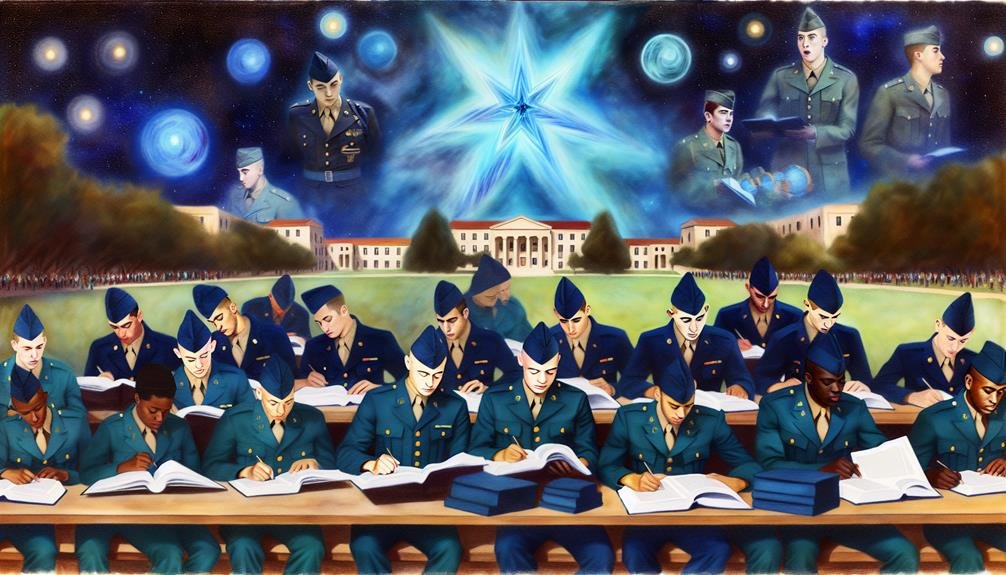Jumping into ROTC in college is like immersing yourself in a pool of leadership skills, military training, and lifelong camaraderie! You get to hone your decision-making, teamwork, and essential life skills like a shiny treasure chest. Plus, who doesn’t love the idea of scholarships beckoning at you like enthusiastic puppies ready to cover your expenses, right? But hey, there’s a flip side too, like balancing books with push-ups and managing dual obligations like a pro. If you’re curious about the ins and outs of ROTC, just keep exploring!
Takeaways
- Pros: Develop leadership skills, gain practical training, receive financial assistance, enhance career opportunities, build lifelong camaraderie.
- Cons: Demanding schedule, time management challenges, academic pressure, stress and fatigue, balancing dual obligations.
Benefits of ROTC Participation
Participating in the Reserve Officers’ Training Corps (ROTC) program at colleges provides students with invaluable leadership skills and practical military training. It’s like starting on an adventure where you not only learn how to lead but also gain hands-on experience in military tactics and strategies.
Imagine getting to be part of a team where discipline, teamwork, and decision-making are the norm. That’s ROTC for you!
ROTC offers a unique opportunity to develop essential skills that will benefit you in both your academic and future professional endeavors. Through rigorous training exercises, you’ll learn how to communicate effectively, think critically under pressure, and motivate others towards a common goal. These are skills that will set you apart in any career path you choose to pursue.
Moreover, the sense of camaraderie and accomplishment you’ll experience in ROTC is unmatched. The bonds you’ll form with your fellow cadets will last a lifetime, creating a support system that extends far beyond your college years.
Leadership Development Opportunities
Beginning the journey of participating in ROTC in college opens up a world of leadership development opportunities. Through ROTC, students not only acquire valuable skills but also cultivate essential traits that shape them into strong leaders.
This growth not only impacts their college experience but also sets the stage for promising career opportunities ahead.
Skills Gained Through ROTC
Enhancing leadership capabilities is a fundamental aspect of the skills gained through participating in ROTC programs at colleges. Through rigorous training, ROTC cadets develop essential skills like effective communication, strategic thinking, and decision-making under pressure.
Imagine maneuvering through complex scenarios with precision, like a chess grandmaster plotting their next move – that’s the kind of mental acuity ROTC fosters.
Leadership in ROTC isn’t just about barking orders; it’s about inspiring and guiding a team towards a common goal. Cadets learn to lead with empathy, understanding the strengths and weaknesses of each team member to maximize overall performance.
It’s like conducting an orchestra – each instrument plays a significant role, and a skilled leader brings out the best in every musician.
Moreover, ROTC cultivates resilience and adaptability, preparing cadets to face challenges head-on with a can-do attitude. It’s like being a superhero, ready to tackle any obstacle that comes your way.
These skills aren’t just valuable in the military – they’re essential for success in any career path.
Impact on Career Opportunities
The leadership development opportunities provided by ROTC programs in colleges greatly impact cadets’ future career prospects, equipping them with essential skills sought after in various professional fields. Through ROTC, cadets have the chance to hone their leadership, teamwork, and decision-making abilities, setting them apart in the competitive job market.
These programs offer hands-on experience in leading teams, managing resources, and overcoming challenging situations – all vital skills that employers value highly.
The leadership training in ROTC instills confidence and resilience in cadets, preparing them to tackle real-world challenges with grace and determination. Whether pursuing a career in the military, business, healthcare, or any other field, the leadership skills acquired through ROTC can open doors to exciting opportunities and fast-track career growth.
In essence, ROTC doesn’t just shape cadets into strong leaders; it molds them into well-rounded individuals ready to take on the world.
Financial Assistance Available

One notable benefit of participating in ROTC programs at colleges is the financial assistance available to students. This assistance can greatly alleviate the financial burden of pursuing higher education and help students focus on their studies and training.
Here are three ways in which ROTC programs provide financial support:
- Scholarships: ROTC offers various scholarships that cover tuition, fees, and sometimes even provide a stipend for living expenses. These scholarships can make a college education more affordable and accessible for students who may not have the financial means to attend otherwise.
- Monthly Stipends: In addition to scholarships, ROTC cadets receive monthly stipends. These stipends help offset personal expenses and allow students to focus on their academic and military training without having to worry as much about finances.
- Job Security: Upon graduation, ROTC cadets commission as officers in the military, ensuring a stable job and salary immediately after completing their degree. This job security can be a relief for students concerned about post-graduation employment.
Time Commitments and Requirements
Let’s talk about the time commitments and requirements that come with being part of ROTC in colleges. From balancing academic courses with physical training to meeting program-specific obligations, being in ROTC requires a strong commitment to manage time effectively.
Understanding the demands of the program and the expectations placed on participants is essential for success in this rigorous but rewarding journey.
Time Demands Analysis
An analysis of time demands in ROTC programs at colleges reveals significant commitments and requirements students must fulfill. Participating in ROTC is not just about showing up for a few hours a week; it requires dedication, time management, and a strong work ethic. Here are some key aspects of the time demands in ROTC programs:
- Physical Training:
Early morning workouts are a common occurrence in ROTC. Picture yourself waking up at the crack of dawn, donning your workout gear, and sweating it out with your fellow cadets. It’s not just about getting fit; it’s about building camaraderie and discipline.
- Academic Classes:
In addition to regular college coursework, ROTC students have military science classes to attend. These classes cover a wide range of topics, from leadership principles to military history, adding another layer to the academic workload.
- Field Training Exercises:
ROTC cadets often participate in field training exercises, where they practice essential skills like land navigation, marksmanship, and tactical maneuvers. These exercises can take up entire weekends, immersing students in a hands-on learning experience that sets ROTC apart from traditional college programs.
Program Requirements Overview
A thorough understanding of the time commitments and requirements associated with participating in an ROTC program is essential for prospective students considering this path. ROTC programs vary in their specific requirements, but they generally include a mix of academic classes, physical training sessions, leadership labs, and field training exercises. These commitments can add up, so it’s important to be prepared for the dedication required to excel in an ROTC program.
On average, ROTC cadets can expect to spend around 3-6 hours per week in classroom instruction, with additional hours dedicated to physical training and leadership development activities. In addition to these regular commitments, cadets also participate in weekend field training exercises and summer training programs, which can range from a few days to several weeks.
While the time demands of an ROTC program may seem challenging, many cadets find that the skills and experiences gained through their participation are well worth the investment.
Career Implications and Advantages

Exploring the career implications and advantages of participating in ROTC at colleges provides students with valuable insights into the potential long-term benefits of this program. Joining ROTC can set you up for success in various ways:
- Leadership Skills: ROTC hones your leadership abilities, teaching you how to motivate and guide a team effectively. These skills are highly valued in the professional world, opening up opportunities for advancement in any career.
- Networking Opportunities: Through ROTC, you build connections with fellow cadets, instructors, and military personnel. These relationships can be instrumental in securing internships, job offers, and mentorship in the future.
- Financial Support: ROTC offers scholarships that can help alleviate the financial burden of college tuition. Additionally, upon graduation, you may have access to job opportunities with competitive salaries and benefits in the military or civilian sectors.
Challenges Faced by ROTC Students
Managing the demanding schedule and rigorous physical training requirements of ROTC can present significant challenges for students pursuing this program in college. Balancing academic responsibilities with early morning drills, leadership labs, and field training exercises requires exceptional time management skills and unwavering dedication.
Imagine waking up before the crack of dawn to gear up for a challenging workout, only to rush to class right after, with barely enough time to grab a quick breakfast. ROTC students often find themselves juggling assignments, exams, and military obligations, aiming to excel in both domains.
The pressure to perform well academically while meeting military standards can be overwhelming at times, leading to stress and fatigue. Despite these obstacles, ROTC students persevere, drawing strength from their camaraderie and shared sense of purpose.
Through teamwork and resilience, they navigate these challenges, honing their leadership skills and preparing for future success in the military and beyond.
Balancing ROTC With College Life

Maintaining a harmonious integration of ROTC commitments with academic and social aspects of college life requires strategic planning and adaptability. Balancing the rigorous training, leadership development, and community service of ROTC with coursework and social activities can be challenging but incredibly rewarding.
Here are three tips to help you navigate this balancing act:
- Create a Detailed Schedule: Utilize planners or digital apps to map out your ROTC training sessions, class times, study hours, and social events. Having a visual representation of your commitments can help you allocate time efficiently and avoid conflicts.
- Prioritize Tasks: Identify the most critical tasks each day and tackle them first. Whether it’s a ROTC physical training session or a looming assignment deadline, staying organized and prioritizing tasks based on urgency can prevent last-minute stress.
- Communication is Key: Keep open lines of communication with professors, ROTC officers, and friends. Let them know your schedule and commitments, so they can support and accommodate your responsibilities.
Frequently Asked Questions
Can International Students Join ROTC Programs in Colleges?
International students can join ROTC programs in colleges, but eligibility may vary based on visa restrictions and security clearance requirements. It is advisable for international students to consult with their designated school officials and ROTC program directors for specific guidance.
Are There Restrictions on the Choice of College Majors for ROTC Participants?
ROTC participants are typically encouraged to pursue majors that align with military career paths to enhance skill development, but restrictions on college majors vary by branch. Some branches may have specific requirements or preferences regarding majors.
How Does ROTC Training Prepare Students for Civilian Careers?
ROTC training provides students with leadership, teamwork, and critical thinking skills essential for civilian careers. Through practical experience, mentorship, and character development, participants are equipped to excel in various professional fields beyond military service.
Are There Opportunities for ROTC Students to Study Abroad?
ROTC students often have opportunities to study abroad, gaining valuable international exposure and cultural understanding. These experiences can enhance their leadership skills, broaden their perspectives, and provide unique insights that can benefit their future careers.
Do ROTC Programs Provide Mental Health Support for Participants?
ROTC programs typically offer mental health support for participants through counseling services, peer support groups, and referral networks. Ensuring the well-being of ROTC members is a priority to help them navigate the rigorous demands of military training.
Conclusion
To sum up, participating in ROTC in college can provide valuable leadership development opportunities, financial assistance, and career advantages.
However, it also comes with time commitments and challenges that can be difficult to balance with academic and social life.
Ultimately, the decision to join ROTC should be carefully considered based on individual goals and priorities.

